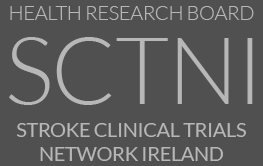Network Trials
SCTNI aims to provide Irish patients access to cutting edge new treatments with the potential to prevent strokes, or to improve emergency treatment and recovery after stroke.
Convince
A randomised clinical trial of low-dose colchicine for secondary prevention after stroke.
Therapy area:
Stroke prevention
Rationale:
Inflammation of atherosclerotic plaque is an important contributor to plaque rupture, leading to stroke and heart attack. Treatments which inhibit inflammation may prevent second stroke, heart attack, and death in patients after first stroke or transient ischaemic attack (TIA)
Design:
Prospective, Randomised Open-label, Blinded Endpoint assessment (PROBE) controlled clinical trial. This is a Phase 3 trial to compare low-dose colchicine (0.5mg/day) plus usual care, to usual care alone, to prevent recurrent ischaemic stroke and coronary events after non-cardioembolic stroke and TIA.
Main eligibility criteria:
Written informed consent; Age ≥ 40 years; Stroke/TIA ≥ 72 hours since onset and ≤ 28 days prior to randmonisation; Stroke – disability of ≤ 3 on Modified Rankin Score (mRS) or High Risk TIA(ABCD2 ≥ 4); eGFR ≥ 50 ml/min
Chief investigator: Prof Peter Kelly, University College Dublin
ESCAPE-NA1
Therapy area:
Acute stroke
Rationale:
The ESCAPE-NA-1 study is designed to determine the safety and efficacy of the neuroprotectant, NA-1, in reducing global disability in subjects with major acute ischemic stroke (AIS) with a small established infarct core and with good collateral circulation who are selected for endovascular revascularization.
Objective:
To determine the efficacy of the neuroprotectant, NA-1, in reducing global disability in subjects with major acute ischemic stroke (AIS) with a small established infarct core and with good collateral circulation selected for rapid endovascular revascularization.
Trial configuration:
A Phase 3, randomized, multicentre, blinded, placebo-controlled, parallel group, single-dose design.
Link: https://www.ucalgary.ca/dcns/research/escape-na1/
Chief investigator: Prof Michael D Hill, MD MSc University of Calgary
TEMPO-2
Therapy area:
Acute stroke
Rationale:
Patients with minor stroke symptoms (NIHSS ≤ 5) who have an M2 or more distal occlusion of a major brain artery and are at high risk of deterioration and disability. Thrombolytic (clot-buster) drugs such as tenecteplase may re-open occluded arteries and improved outcomes in such patients.
Design:
A Phase 3, prospective, randomized controlled, open-label with blinded outcome assessment (PROBE) trial.
Objective:
To investigate whether tenecteplase (TNK-tPA) has benefit and is safe for treatment of minor ischemic stroke with proven arterial occlusion.
Treatment:
Up to 1274 male and female adult patients will be randomized to TNK-tPA or standard care. The trial involves one treatment delivered acutely with a 90-day follow-up period.
Link: https://www.ucalgary.ca/dcns/research/tempo-2/
Chief investigator: Dr Shelagh Coutts, University of Calgary, Canada
ELAN
Therapy area:
Stroke Prevention
Rationale:
Direct oral anticoagulants (DOACs) are highly effective for secondary stroke prevention in patients with an acute ischaemic stroke and atrial fibrillation (AF), but DOACs were never initiated <7 days after stroke onset in recent trials. The ELAN trial will determine the net benefit of early versus late initiation of DOACs in patients with acute ischaemic stroke related to AF.
Objective:
The main objective is to estimate the net benefit of early versus late initiation of DOACs in patients with acute ischaemic stroke related to AF.
Trial configuration:
A phase III prospective Randomised-controlled, Two-arm, Assessor-blinded Trial.
Link: https://www.elan-trial.ch/
Chief investigator: Prof. Urs Fischer, Dept. of Neurology, Inselspital Bern
ETNA-AF
Therapy area:
Stroke prevention
Rationale:
Edoxaban was recently approved in Europe for the prevention of stroke and systemic embolism in adult patients with atrial fibrillation with one or more vascular risk factors. Despite positive data from large clinical trials, Phase 4 ‘real-world’ information is needed to further understand the safety and efficacy of edoxaban in routine clinical practice.
Objective:
The primary objective of ETNA is to collect and evaluate Phase 4 real- world safety data on bleeding and other adverse events and cardiovascular and all-cause mortality in edoxaban-treated patients with atrial fibrillation.
Design:
Real world data of safety and outcomes of edoxaban-treated patients in routine clinical practice will be collected and evaluated in 13,100 patients, treated by specialized and non-specialized physicians in hospitals and office-based clinical settings.
Chief sponsor: Daiichi Sankyo Europe, Munich, Germany

